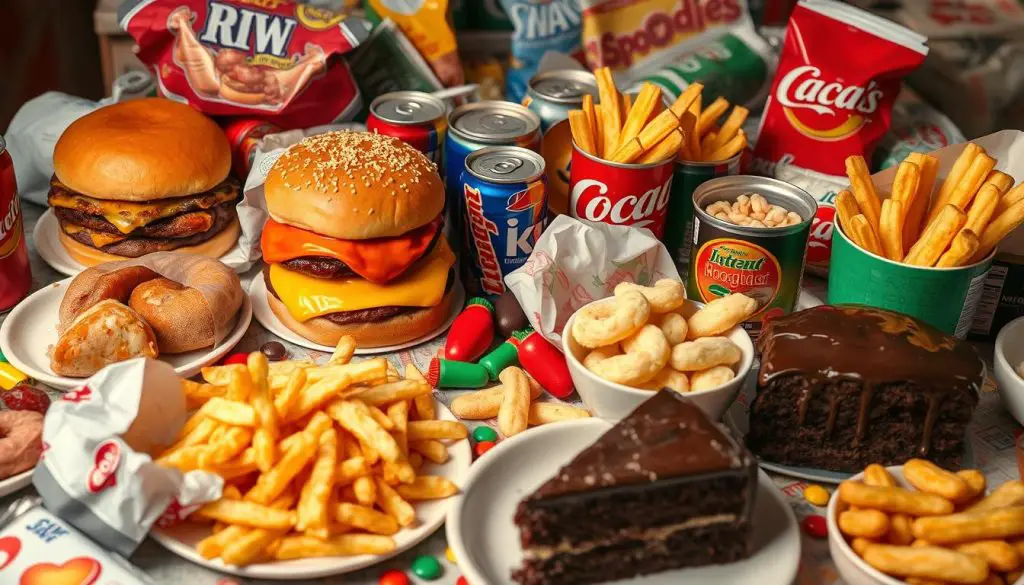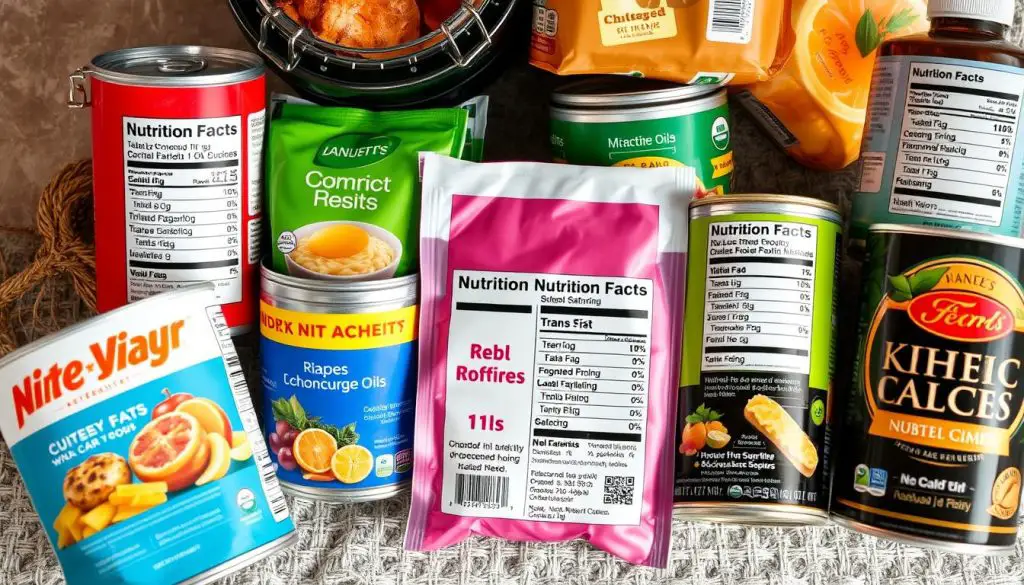Did you know the average American consumes over 3,600 calories daily? This far exceeds the recommended amount. It underscores the urgent need to tackle unhealthy food choices in our diets. In this guide, we’ll delve into the 10 most common unhealthy foods that harm your health. We’ll also offer practical tips for making better, more nutritious choices.

Key Takeaways
- Understand the short-term and long-term effects of poor food choices on your body and mind.
- Identify the hidden dangers in processed fast food, sugary beverages, and refined grains.
- Learn about the risks associated with chemical additives, preservatives, and artificial ingredients.
- Discover the link between unhealthy foods and chronic diseases like heart disease, diabetes, and cancer.
- Explore healthier alternatives to the most common unhealthy food items.
Understanding the Impact of Poor Food Choices on Health
Making informed decisions about the foods we consume is crucial for maintaining optimal health. Poor food choices can have a significant impact on our bodies and minds, both in the short and long term. Let’s dive deeper into how these choices can affect us.
Short-term Effects on Body and Mind
Indulging in sugary beverages, foods high in saturated fats, and excessive sodium intake can lead to immediate consequences. These types of foods can cause energy crashes, mood swings, and difficulty concentrating. Consuming empty calories without essential nutrients can leave us feeling sluggish and fatigued, compromising our overall well-being.
Long-term Health Consequences
Sustained consumption of unhealthy foods can pave the way for more severe health issues. A diet rich in sugary beverages, processed meats, and refined carbohydrates increases the risk of developing chronic diseases, such as obesity, type 2 diabetes, and heart disease. Nutritional deficiencies caused by a lack of essential vitamins and minerals can also lead to a weakened immune system and other long-term complications.
Link to Chronic Diseases
The connection between poor food choices and chronic diseases is well-established. Sugary beverages, for instance, have been linked to an increased risk of type 2 diabetes, while saturated fats and sodium intake have been associated with a higher likelihood of developing heart disease. Maintaining a balanced diet and limiting the consumption of empty calories and nutritional deficiencies can go a long way in reducing the risk of these debilitating conditions.
Processed Fast Food: The Hidden Dangers
Processed unhealthy foods and fast food items dominate many diets, offering convenience but compromising our health. The dangers within these processed foods are often ignored. Let’s explore the world of fast food and reveal the risks of frequent consumption of these unhealthy food items.
Processed fast food is often made with refined ingredients. These foods to avoid contain unhealthy additives, preservatives, and artificial flavors. These can harm our bodies. The high levels of salt, sugar, and unhealthy fats in these processed foods can cause weight gain, high blood pressure, and increase the risk of chronic diseases.
Fast food preparation methods also pose health risks. Deep-frying in oils high in unhealthy trans fats and using pre-cooked, pre-packaged ingredients lacking essential nutrients are common. Regularly consuming these unhealthy food items can significantly affect our well-being.
| Unhealthy Fast Food Ingredients | Potential Health Consequences |
|---|---|
| Refined Carbohydrates | Blood sugar spikes, weight gain, and increased risk of type 2 diabetes |
| Excessive Sodium | High blood pressure, water retention, and increased risk of heart disease |
| Trans Fats | Elevated cholesterol levels, inflammation, and increased risk of heart disease |
| Artificial Additives | Disruption of gut health, potential carcinogenic effects, and neurological issues |
The convenience of processed fast food comes at a high health cost. By understanding the hidden dangers and making better choices, we can improve our health. This reduces the negative effects of these unhealthy food items on our bodies.
Sugar-Laden Beverages and Their Health Risks
In today’s fast-paced world, sugar-laden drinks have become a ubiquitous part of our daily routines. From sugary sodas to energy-boosting beverages, these tempting concoctions can have a significant impact on our overall health. Let’s dive into the hidden dangers of these sugar-laden foods and explore their far-reaching consequences.
Impact on Blood Sugar Levels
Consuming sugar-laden beverages can lead to a rapid spike in blood sugar levels, followed by a subsequent crash. This rollercoaster of blood sugar fluctuations can wreak havoc on the body, contributing to fatigue, mood swings, and an increased risk of developing type 2 diabetes over time. Limiting your intake of high-calorie snacks and refined carbohydrates is crucial for maintaining a healthy blood sugar balance.
Dental Health Concerns
The high sugar content in many popular drinks can also have a detrimental effect on your dental health. These sugar-laden foods and beverages can erode tooth enamel, leading to cavities, gum inflammation, and other oral health issues. Practicing good oral hygiene and reducing your consumption of sugary drinks can go a long way in maintaining a healthy, radiant smile.
Hidden Calories in Popular Drinks
Many people are unaware of the staggering amount of calories hidden in their favorite beverages. A single can of soda or a seemingly harmless energy drink can contain upwards of 30-40 grams of sugar, translating to a significant calorie load. Opting for water, unsweetened teas, or low-calorie alternatives can help you avoid the pitfalls of hidden calories and support your overall health and fitness goals.
By understanding the risks associated with sugar-laden beverages, we can make more informed choices and prioritize our well-being. Moderation and mindfulness are key when it comes to incorporating these drinks into a balanced, nutritious diet.
White Bread and Refined Grains
White bread and refined grains are often overlooked as unhealthy snacks and high-sodium foods. Despite their common use, they can significantly affect our health.
The main problem with white bread and refined grains is their lack of nutritional value. The processing removes the nutrient-rich bran and germ, leaving behind a artificial additive-filled, sugary product. This results in a loss of essential vitamins, minerals, and fiber, vital for our health.
Eating white bread and refined grains can cause blood sugar levels to rise quickly. This can lead to weight gain and an increased risk of type 2 diabetes. Additionally, the lack of fiber can upset the body’s digestive system, causing constipation and other gastrointestinal issues.
- White bread and refined grains lack essential nutrients, vitamins, and fiber.
- They can cause rapid blood sugar spikes, leading to weight gain and increased diabetes risk.
- Refined grains can disrupt the body’s natural digestive processes, causing gastrointestinal issues.
“Choosing whole grains over refined ones is a simple yet impactful way to improve your overall health and well-being.”
To ensure a balanced and nutritious diet, it’s important to choose whole-grain alternatives. Options like whole-wheat bread, brown rice, and quinoa are rich in nutrients and fiber. These are crucial for maintaining a healthy body and mind.
Unhealthy Food: Breaking Down the Most Common Culprits
Understanding the unhealthy foods we consume is key to a healthy diet. Chemical additives, preservatives, artificial colors, and flavors are common culprits. These ingredients can significantly affect our well-being. Let’s explore the hidden dangers in our daily meals and snacks.
Chemical Additives and Preservatives
Processed and convenience foods often contain chemical additives and preservatives. These extend shelf life and enhance flavor. However, fried foods, convenience foods, and unhealthy cooking oils can harm our health. They can lead to hormonal imbalances and even cancer.
Artificial Colors and Flavors
Manufacturers use artificial colors and flavors to make processed foods appealing. These additives, found in high-sugar cereals and convenience foods, can harm our health. Research links them to behavioral issues, hyperactivity, and potential cancer risks.
| Unhealthy Ingredient | Potential Health Concerns | Common Food Sources |
|---|---|---|
| Chemical Additives and Preservatives | Hormonal imbalances, cancer, digestive issues | Fried foods, convenience foods, unhealthy cooking oils |
| Artificial Colors and Flavors | Behavioral issues, hyperactivity, potential carcinogenic effects | High-sugar cereals, convenience foods |
Knowing the dangers of these common culprits helps us make better food choices. Choosing whole, minimally processed foods can help avoid harmful additives and artificial flavorings.
Fried and High-Fat Snacks
Fried and high-fat snacks, tempting as they are, pose significant health risks. These treats, common in fast food and sugary desserts, harm our heart health and weight management. They can lead to unhealthy cholesterol levels and increase the risk of heart disease and strokes.
The high oil and fat in fried snacks, like potato chips and doughnuts, contribute to unhealthy cholesterol buildup. This can lead to heart disease and strokes. Their high calorie content also contributes to weight gain, making a healthy lifestyle challenging.
Healthier Alternatives to Satisfy Cravings
Fortunately, healthier options exist to satisfy your cravings without harming your health. Here are some alternatives:
- Baked or air-fried versions of your favorite snacks, which use significantly less oil and fat
- Fresh fruits and vegetables, such as apple slices, carrot sticks, or bell pepper strips, paired with a light dip or hummus
- Whole-grain crackers or rice cakes topped with nut butter or a small serving of cheese
- Unsalted nuts and seeds, which provide healthy fats and fiber
By choosing nutrient-dense snacks, you can enjoy your favorite flavors while supporting your overall health.
| Fried Snack | Healthier Alternative | Calorie Comparison |
|---|---|---|
| Potato Chips | Baked Potato Chips | Potato Chips: 150 calories per serving Baked Potato Chips: 100 calories per serving |
| French Fries | Roasted Sweet Potato Wedges | French Fries: 230 calories per serving Roasted Sweet Potato Wedges: 130 calories per serving |
| Doughnuts | Whole-Grain Muffins | Doughnuts: 250 calories per serving Whole-Grain Muffins: 180 calories per serving |
By choosing healthier options and understanding the risks of fried and high-fat snacks, you can enjoy your favorite flavors while prioritizing your long-term health.
Processed Meats and Cancer Risk
Processed meats, like bacon, sausage, and deli slices, have been under intense scrutiny. Studies have shown a link between these foods and various cancers, including colorectal, stomach, and prostate. The World Health Organization (WHO) has classified them as “carcinogenic to humans,” highlighting a significant health risk.
Nitrates and Their Effects
Nitrates in processed meats are a major concern. They are used as preservatives and to enhance color. Once consumed, nitrates can turn into nitrites, leading to the formation of N-nitroso compounds. These compounds can damage DNA and promote tumor growth.
Sodium Content Concerns
Processed meats are also high in sodium. High sodium intake can lead to high blood pressure, heart disease, and stroke. Reducing processed meat consumption can help lower sodium intake and support heart health.
While the link between processed meats and cancer is strong, individual risks vary. Genetics, diet, and lifestyle influence cancer susceptibility. Nonetheless, cutting down on processed meats is a wise choice for long-term health.
“Processed meats are classified as carcinogenic to humans – this means that there is convincing evidence that processed meat causes cancer.” – World Health Organization
For healthier protein options, consider plant-based sources like legumes, nuts, and seeds. Choose fresh, unprocessed meats and limit processed varieties. These changes can significantly reduce cancer and chronic disease risks.
High-Sugar Breakfast Cereals
Breakfast is the cornerstone of our day, influencing our energy and nutrient intake. Yet, many popular cereals are loaded with sugar, threatening our health. These cereals can harm heart health, raise diabetes risk, and contribute to weight gain. It’s time to examine these sugary breakfast choices more closely.
Looking at the nutrition labels of top cereal brands, a disturbing fact emerges. Some have up to 15 grams of sugar per serving, exceeding the daily limit for added sugars. This excessive sugar can cause blood sugar spikes, leading to insulin resistance and a higher diabetes risk. Moreover, these cereals often lack fiber and essential nutrients, leaving us hungry and prone to weight gain.
| Cereal Brand | Sugar Content (per serving) | Fiber Content (per serving) |
|---|---|---|
| Frosted Flakes | 10g | 1g |
| Fruit Loops | 12g | 1g |
| Cinnamon Toast Crunch | 9g | 0g |
| Lucky Charms | 10g | 1g |
For a healthier start, switch to whole-grain cereals that offer better nutrition. Opt for oatmeal, quinoa, or Greek yogurt with berries. These choices provide lasting energy, support heart health, and promote healthy food choices.
“Breakfast is the most important meal of the day, and it’s crucial to make smart food choices that nourish our bodies and minds.”
Trans Fats and Processed Oils
In the realm of healthy eating, trans fats and processed oils are major villains. They can significantly harm our health. It’s vital to know how to spot them on food labels to keep our diets balanced and avoid health risks.
Understanding Food Labels
When examining food labels, watch for “partially hydrogenated” or “hydrogenated” oils. These terms signal the presence of trans fats, linked to heart disease, stroke, and type 2 diabetes. Also, check the total fat and saturated fat content. These can lead to unhealthy eating habits and negative health effects.
Common Sources in Daily Diet
- Fried foods, such as french fries, doughnuts, and fried chicken
- Baked goods, including cookies, cakes, and pastries
- Margarine and shortening
- Microwave popcorn
- Frozen pizzas and other processed foods
Steering clear of these trans fats and processed oils is a big step towards better health. By reading food labels and making smart choices, we can control our diets. This leads to healthier selections that support our well-being.

“Becoming aware of the hidden dangers in our food supply is the first step towards making better choices for our health.”
Artificial Sweeteners and Diet Foods
In the quest for healthier eating, many turn to artificial sweeteners and diet foods. Yet, the debate around these options raises concerns. Understanding the risks and benefits is crucial for making informed choices in nutrition advice, meal planning, and dietary goals.
Artificial sweeteners like aspartame, saccharin, and sucralose are marketed as sugar substitutes. They seem like a quick fix for healthy alternatives. However, their long-term effects on the body are still unclear. Some research links them to weight gain, metabolic disorders, and even cancer.
Diet foods with low-fat or low-calorie labels may not be as healthy as they seem. They often contain artificial ingredients and preservatives to maintain taste and texture. This can contradict dietary guidelines for a balanced, nutrient-rich diet.
When choosing foods, consider the bigger picture. Whole, unprocessed foods are generally safer and more sustainable for improving health and well-being.
| Potential Risks of Artificial Sweeteners | Potential Risks of Diet Foods |
|---|---|
| Increased risk of weight gain and metabolic disorders Potential link to certain types of cancer Disruption of gut microbiome Headaches and other side effects | Reliance on artificial ingredients and preservatives Potential for nutrient deficiencies Lack of satiety leading to overconsumption Potential impact on overall nutrition advice |
As you explore nutrition advice and healthy alternatives, be cautious with artificial sweeteners and diet foods. Focus on whole, nutrient-dense foods and meal planning that follows dietary guidelines. This approach will help you achieve your health and wellness goals sustainably and in balance.
“The key to a healthy diet is not found in artificial sweeteners or processed ‘diet’ foods, but in embracing the natural abundance of whole, unprocessed ingredients.”
Packaged Snacks and Empty Calories
In today’s fast-paced world, packaged snacks have become a common part of our diets. Yet, these convenient treats often hide a cost – empty calories that can significantly affect our health and wellness.
Impact on Weight Management
Packaged snacks are typically high in calories, fat, and added sugars, with little to no nutritional value. Consuming these snacks in excess can lead to weight gain and make it challenging to maintain a healthy weight. The high-calorie content of these snacks can also contribute to the development of chronic health conditions, such as obesity, type 2 diabetes, and heart disease.
Nutritional Deficiencies
- Packaged snacks often lack essential vitamins, minerals, and fiber that our bodies need to function optimally.
- Frequent snacking on these empty-calorie foods can displace more nutrient-dense options, leading to nutritional deficiencies and an imbalanced diet.
- This can result in a range of health issues, from fatigue and weakened immune systems to poor cognitive function and increased risk of chronic diseases.
To maintain a healthy, clean eating lifestyle, it’s important to be mindful of our snacking habits and make conscious choices that prioritize wellness and food awareness. By embracing a balanced diet rich in whole, unprocessed foods, we can nourish our bodies and achieve our health tips goals.
| Packaged Snack | Calories | Fat (g) | Sugar (g) |
|---|---|---|---|
| Potato Chips (1 oz) | 150 | 10 | 1 |
| Chocolate Chip Cookie (1 cookie) | 70 | 4 | 5 |
| Granola Bar (1 bar) | 120 | 5 | 10 |
| Pretzels (1 oz) | 110 | 0 | 1 |
As the table illustrates, even seemingly “healthy” packaged snacks can be high in calories, fat, and added sugars, contributing to the problem of empty calories in our diets. By being mindful of our snacking choices and prioritizing clean eating, we can take proactive steps towards maintaining our overall health and wellness.
Energy Drinks and Sports Beverages
In today’s fast-paced world, many seek energy boosts from drinks. Yet, these drinks can harm our health if overused. It’s vital to understand the risks and the need for mindful eating. This ensures we avoid obesity and support nutrition education.
The Caffeine Conundrum
Energy drinks promise quick energy, but their caffeine can be harmful. Too much caffeine causes jitteriness, anxiety, and heart issues. The mix of caffeine with additives like taurine and guarana can be especially risky.
Sugar Overload and Dehydration
Energy drinks and sports drinks are often very sweet. This diet mistake can lead to obesity by causing blood sugar spikes. It also hinders hydration, as the body focuses on sugar metabolism over fluid replenishment.
Healthier Alternatives
- Water: The simplest and most effective way to stay hydrated during physical activity.
- Herbal teas: Offer a natural energy boost without the risks associated with energy drinks.
- Fresh fruit and vegetable juices: Provide a natural source of vitamins, minerals, and antioxidants to support overall health.
- Unsweetened coconut water: A natural electrolyte-rich beverage that can aid in hydration and recovery.
Choosing wisely among beverages is key to a healthier lifestyle. By focusing on nutrition education, we can sidestep the dangers of energy drinks and sports beverages.
| Beverage | Caffeine Content | Sugar Content | Potential Health Concerns |
|---|---|---|---|
| Energy Drink (16 oz) | 160-300 mg | 54-62 g | Jitteriness, anxiety, heart palpitations, dehydration |
| Sports Drink (32 oz) | 0 mg | 28-34 g | Spike in blood sugar, potential weight gain, tooth decay |
| Water | 0 mg | 0 g | Optimal hydration, no adverse effects |

“Moderation is key when it comes to energy drinks and sports beverages. Excessive consumption can have serious consequences on our health and well-being.”
Microwave Meals and Convenience Foods
In today’s fast-paced world, the allure of microwave meals and pre-packaged foods is undeniable. Yet, these quick fixes often hide health risks. It’s vital to understand these pitfalls to uphold a healthy lifestyle.
Sodium and Preservative Content
Microwave meals and many convenience foods are high in sodium and preservatives. High sodium intake can lead to hypertension and heart disease risks. Preservatives, aimed at extending shelf life, may also harm food safety and overall health.
Lack of Essential Nutrients
Convenience foods often lack essential vitamins, minerals, and nutrients crucial for health. This deficiency can cause nutritional gaps and impair bodily functions. Adopting healthy eating habits with whole, minimally processed foods is more beneficial for your health.
FAQ
What are the most common unhealthy food items to avoid?
Avoid processed snacks, sugary drinks, fast food, and fried items. Also, steer clear of processed meats, white bread, high-sugar cereals, trans fats, and artificial sweeteners. These foods are calorie-dense, high in saturated fats, sodium, and added sugars, posing health risks.
How do poor food choices affect my health in the short and long term?
Unhealthy foods can cause short-term issues like low energy, mood swings, and nutritional deficiencies. Long-term, they can lead to chronic diseases such as obesity, type 2 diabetes, heart disease, and certain cancers.
What are the hidden dangers of processed fast food?
Fast food contains unhealthy ingredients like preservatives, artificial additives, high sodium, and unhealthy fats. Regular consumption can lead to weight gain, high blood pressure, and chronic health issues.
How do sugar-laden beverages affect my health?
Sugary drinks can spike blood sugar, cause dental problems, and add hidden calories. Overconsumption is linked to weight gain, obesity, and type 2 diabetes risk.
What are the negative effects of consuming white bread and refined grains?
White bread and refined grains lack nutrients, cause blood sugar spikes, and lead to weight gain and energy crashes. They are high in refined carbs and low in vitamins, minerals, and fiber.
What are the most common chemical additives and preservatives found in unhealthy foods?
Unhealthy foods often contain artificial colors, flavors, and preservatives like sodium nitrite. These can harm gut health, cause allergic reactions, and increase cancer risk.
How do fried and high-fat snacks impact my health?
Fried and high-fat snacks are high in saturated and trans fats, leading to weight gain, high cholesterol, and heart disease risk. They are low in nutrients and displace healthier options.
What are the cancer risks associated with processed meats?
Processed meats contain nitrates and high sodium, linked to increased cancer risk, especially colorectal cancer. The World Health Organization classifies them as a “probable carcinogen.”
How do high-sugar breakfast cereals affect my health?
High-sugar cereals can cause blood sugar spikes, energy crashes, and weight gain and diabetes risk. They lack essential nutrients and fiber, making them a poor breakfast choice.
How can I identify and avoid trans fats and unhealthy oils in my diet?
Look for “trans fat” or “partially hydrogenated” on labels. Choose healthier fats like olive oil, avocado oil, and nuts and seeds instead.
What are the potential health risks associated with artificial sweeteners and diet foods?
Artificial sweeteners in diet foods and beverages may disrupt gut health, contribute to weight gain, and increase chronic disease risk. Their long-term health effects are still debated.
How do packaged snacks and “empty calories” impact my health and weight management?
Packaged snacks are high in calories, added sugars, and unhealthy fats but lack nutrients. Consuming them can lead to weight gain, nutritional deficiencies, and diet imbalance, making weight management challenging.
What are the potential risks associated with energy drinks and sports beverages?
Energy drinks and sports beverages are high in added sugars, caffeine, and stimulants. They can disrupt hydration, cause jitteriness, and lead to energy crashes. Excessive consumption can contribute to weight gain and health problems.
How can I make healthier choices when it comes to microwave meals and convenience foods?
Opt for minimally processed options with shorter ingredient lists. Prepare healthy meals in advance to avoid the health risks associated with convenience foods.






